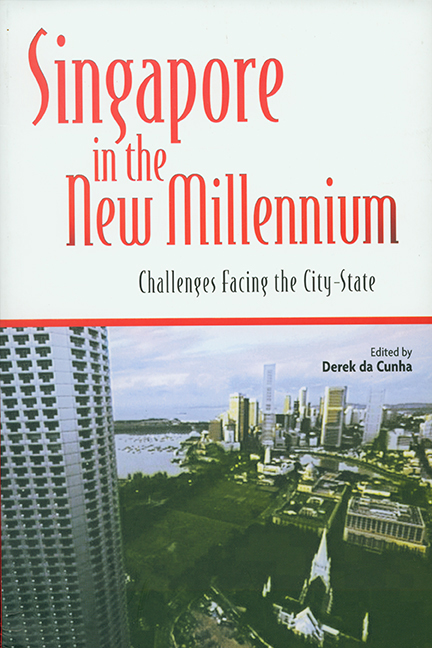Book contents
- Frontmatter
- Contents
- Preface
- Contributors
- 1 The Limits of a City-state: Or Are There?
- 2 External Challenges Facing the Economy
- 3 Governance: Its Complexity and Evolution
- 4 The Future of Civil Society: What Next?
- 5 Relating to the World: Images, Metaphors, and Analogies
- 6 Relating to the World: Images, Metaphors, and Analogies
- 7 Education in the Early 21st Century: Challenges and Dilemmas
- 8 Reframing Modernity: The Challenge of Remaking Singapore
- 9 National Identity, the Arts, and the Global City
- 10 The Media and the Flow of Information
- 11 Conclusion
- Index
11 - Conclusion
Published online by Cambridge University Press: 21 October 2015
- Frontmatter
- Contents
- Preface
- Contributors
- 1 The Limits of a City-state: Or Are There?
- 2 External Challenges Facing the Economy
- 3 Governance: Its Complexity and Evolution
- 4 The Future of Civil Society: What Next?
- 5 Relating to the World: Images, Metaphors, and Analogies
- 6 Relating to the World: Images, Metaphors, and Analogies
- 7 Education in the Early 21st Century: Challenges and Dilemmas
- 8 Reframing Modernity: The Challenge of Remaking Singapore
- 9 National Identity, the Arts, and the Global City
- 10 The Media and the Flow of Information
- 11 Conclusion
- Index
Summary
The world of the new millennium is a very different place from that which Singapore found itself in during its first three decades as an independent nation-state. Singapore's socioeconomic development made impressive gains during the 1970s, 1980s, and 1990s. A confluence of factors were responsible for that salubrious state of affairs. Internal stability, engendered by the dominance of a single political party with generally authoritarian ways, ensured a peaceful and harmonious domestic socio-political environment. Externally, the regional environment was also stable. This was due, in the first instance, to the to the stand-off between the superpowers — the United States and the Soviet Union — during the Cold War years, which paradoxically provided some semblance of constancy and stability in the Southeast Asian geopolitical construct. Subsequently, in the wake of the end of the Cold War, the steady eradication of the ideological divide in Southeast Asia was to see the expansion of the Association of Southeast Asian Nations (ASEAN) to encompass eventually the whole of Southeast Asia. Singapore had positioned itself well during those two phases.
Smallness in size has been an advantage to Singapore, simply because the city-state has been able to react far quicker to international developments than could other larger countries. The lengthy tenure in power of the People's Action Party (PAP) also meant that while the country could quickly adapt itself to any rapidly evolving geopolitical or geoeconomic situation, it still had a long-range vision of itself. Long-term plans and programmes could be formulated without any fear of a change in government, which could otherwise derail such plans and programmes. Additionally, the PAP Government's traits of consistency, predictability, and relative incorruptibility have been the sorts of credentials that have made Singapore a highly attractive location for foreign direct investment. This has been particularly apparent in contrast to much of the rest of Southeast Asia, where governments have been known to be far less consistent, predictable, and incorruptible. The Asian economic crisis of 1997–98 showed the extent to which Singapore was different from other affected countries in Southeast Asia.
- Type
- Chapter
- Information
- Singapore in the New MillenniumChallenges Facing the City-State, pp. 269 - 275Publisher: ISEAS–Yusof Ishak InstitutePrint publication year: 2002



